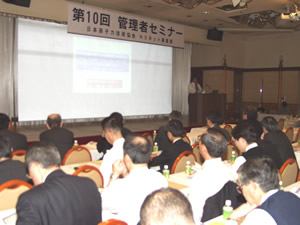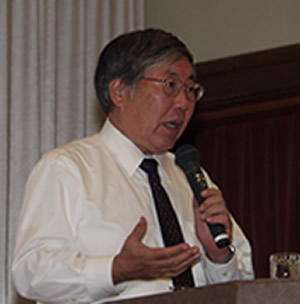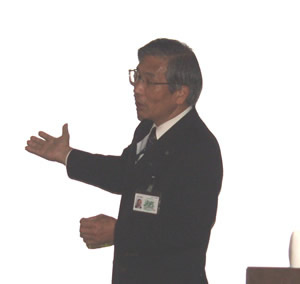|

|
On November 17, 2005, at the Tokyo Grand Hotel in Minato-ku, Tokyo, the 10th Manager Seminar was held for manager class employees of member companies, with about 120 persons attending.This seminar started with an opening address by Executive Director Hiroshi Noda, and featured two lectures focusing on human factors, organizational factors that affect human factors and the underlining safety culture, with members sharing awareness on associated initiatives.
|
|
Lectures
|
|

Mr. Inoue
|
First Section
A lecture title;
`Human Factors and Safety Culture'
This lecture explored numerous cases, such as a jumbo-jet collision incident, to describe background elements, especially human factors.
In the lecture, he talked about the following:
*Human behavior follows the pattern of Perception, Cognition, Judgment and Action. As characterized with the Perception function, human behavior inevitably contains the characteristic of seeing what one wishes to see, and hearing what one wishes to hear. It is important to recognize "human error" as a consequence of mismatch between this characteristic and environmental conditions.
*Therefore, rules must be drawn up in a way that enables compliance, with full consideration to the human characteristic.
*In other words, human error is not a cause but a result. It is the events that trigger human error that constitutes the primary cause.
*All organization members must share the recognition that human behavior inevitably fluctuates. It is important to eliminate the approach of imposing responsibility to directly involved persons, and introduce proactive measures on controllable elements such as organizational and environmental factors, so that human error would not result in an accident.
*Featuring the above contents, the lecture highlighted the fragility of human behavior, and the importance of building a safety culture in recognition of that fragility.
|

Mr. Sekiguchi
|
Second Section
A lecture title;
`Learn from the accidents of failure events -Organizational Culture to the Safety Cultures'
The lecture referred to the following lessons learned from past railway accidents:
*Examples of accidents involving operation managers point to the importance of "reporting," "informing" and "consulting." Managers should check whether they can issue accurate instructions / commands, and provide clear description / subtle assistance to subordinates.
*A vertical organization structure induces accidents. It is important to manage the gaps between organizational units.""Who are in command in on-site operations? Command structures must be clearly defined.
*Designers must visit and inspect operation sites, so as to learn how on-site operations are implemented.
*Senior management must define safety as the top management priority, and switch from the stance of maintaining safety to the approach of proactively ensuring safety.
|
The questionnaire survey conducted after the lectures collected many views, including the following.
Lecture by Kanto Gakuin University Prof. Shiichiro Inoue
(chief researcher, Institute for Science of Labour) *It was a very valuable lecture. It helped me fully understand the basics of human behavioral patterns. I gained a useful insight into human error prevention and the development of recurrence prevention measures.
*Regarding "human factors," area engineers do not feel much empathy, this lecture cited a variety of examples to provide an easy-to-understand explanation. It provided useful references in developing safety initiatives.
Lecture by Masao Sekiguchi, Training Division Manager, JR East Personnel Service.
* The lecture renewed my recognition of the importance of the communication style based on "reporting," "informing" and "consulting."
*Using extensive experience in accident inquiries, the lecturer emphasized the importance of principles built from an on-site perspective. It was a very beneficial lecture. As a manager, I deeply felt the importance of directly dealing with my subordinates.
These are among the many feedbacks gathered. |
|







